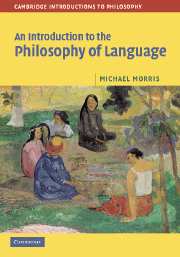Book contents
- Frontmatter
- Contents
- Acknowledgements
- Introduction
- 1 Locke and the nature of language
- 2 Frege on Sense and reference
- 3 Russell on definite descriptions
- 4 Kripke on proper names
- 5 Natural-kind terms
- 6 Quine on de re and de dicto modality
- 7 Reference and propositional attitudes
- 8 The semantics of propositional attitudes
- 9 Davidson on truth and meaning
- 10 Quine and Davidson on translation and interpretation
- 11 Quine on the indeterminacy of translation
- 12 Austin on speech acts
- 13 Grice on meaning
- 14 Kripke on the rule-following paradox
- 15 Wittgenstein on the Augustinian picture
- Glossary
- Works cited
- Index
13 - Grice on meaning
Published online by Cambridge University Press: 05 June 2012
- Frontmatter
- Contents
- Acknowledgements
- Introduction
- 1 Locke and the nature of language
- 2 Frege on Sense and reference
- 3 Russell on definite descriptions
- 4 Kripke on proper names
- 5 Natural-kind terms
- 6 Quine on de re and de dicto modality
- 7 Reference and propositional attitudes
- 8 The semantics of propositional attitudes
- 9 Davidson on truth and meaning
- 10 Quine and Davidson on translation and interpretation
- 11 Quine on the indeterminacy of translation
- 12 Austin on speech acts
- 13 Grice on meaning
- 14 Kripke on the rule-following paradox
- 15 Wittgenstein on the Augustinian picture
- Glossary
- Works cited
- Index
Summary
Key text
H. P. Grice, ‘Meaning’, The Philosophical Review, 66 (1957), pp. 377–88.
Introduction
In the last few chapters, we've been circling round what may seem to be the most basic question in the philosophy of language: what is it for linguistic expressions to have meaning at all? Quine's and Davidson's insistence on the central importance of radical interpretation does say something relevant to this question. They claim, in effect, that what is meant in one language is always open, in principle, to being captured in another language. And they make it central to meaning that it is something to be understood in the course of a general project of understanding people. Working from another angle, Austin's work places language among the actions that are performed in getting things done. But none of this seems to address the basic question directly.
And the basic question can seem very pressing – almost bewildering, in fact. For suppose we think, as it can seem very natural to think, that words are, at bottom, just types of mark or sound: things which have no meaning in themselves. How could something like that have any meaning at all? This is the question which Paul Grice seems to be addressing in a series of papers, beginning with the ground-breaking ‘Meaning’, which is the focus of this chapter. The precise details of his answer have often been questioned, but many of the questioners (who include Grice himself) have been in broad sympathy with his approach.
Information
- Type
- Chapter
- Information
- An Introduction to the Philosophy of Language , pp. 248 - 270Publisher: Cambridge University PressPrint publication year: 2006
